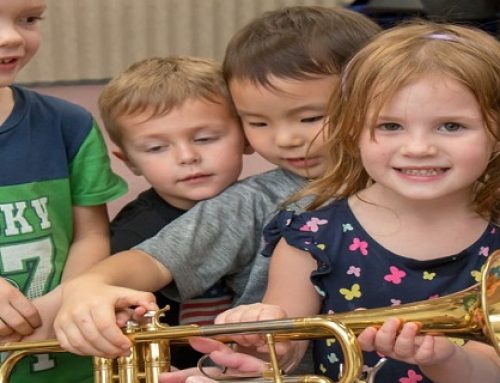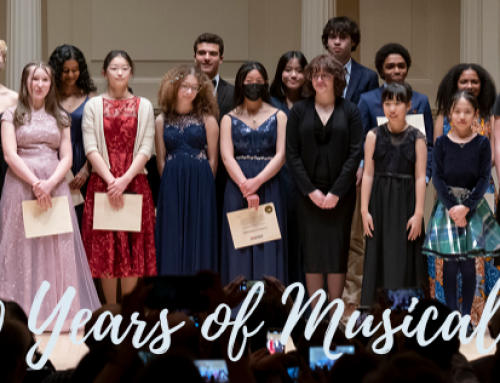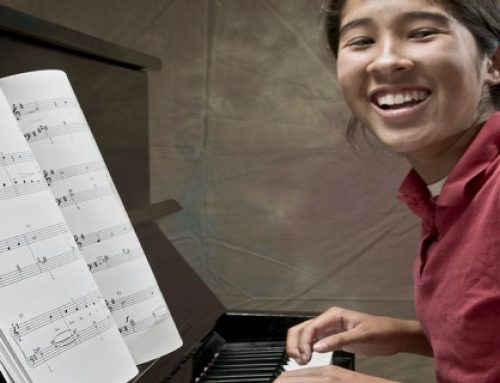So your child has started music lessons, and they love their teacher, the lessons themselves, and are now practicing every day. Now, a few weeks or months have gone by and they have started to lose the motivation to practice. Or maybe they are having some trouble focusing during their practice sessions and need you there for support. Below, we have outlined a few tactics to try with your child to help motivate and assist them during practice sessions.
Make sure the instrument is visible
Keep your child’s instrument in the front room with the case open, or if they play piano, make sure it is visible in your home. Often the hardest part of practicing is just getting started, so having the instrument out in the open brings them one step closer.
Daily repetition is important
Encourage your child to practice a little bit each day! The goal is to make practicing a part of their daily routine. The more consistently they practice, the better retention rate they will have, and the quicker they will improve. The longer they wait in between practice sessions, the more frustrated they will be when they cannot complete a music lesson assignment at home.
It’s best to find a regular time to practice every day, whether it’s in the morning before school or right after they finish their homework. When they practice is up to you and them, but it should always be at the same time so that practicing becomes an established part of their routine. If a young child is developing their attention span, it can be more productive to divide practice time into two or three sessions in a day (lasting between 10 or 15 minutes each). Another practice technique for young students is to focus on completing a specific task instead of practicing for a certain amount of time. For example: the child could plan to practice two measures correctly 5 times in a row twice a day.
Quiet zone while practicing
Make sure that there are not any distractions around while your child is practicing. They should be in a quiet room without the temptation of a computer, television, or phone; their siblings should be instructed not to bother them during this time; and pets should be kept out of the room.
Many children like to have a parent keep them company while they practice. The teacher might ask you to help with your child’s assignment (ex. Watch your child’s hand position or help them count rhythms). If you are not helping your child practice, you can simply sit and read or get some work done. Keep suggestions or criticism to yourself unless your child asks you for help. The teacher will work with your child to fix any problems that arise during their music lessons.
Good practice is intentional practice
Before your child starts practicing, ask them what their goal is. It could be to play a certain passage five times in a row or to work on scales. Their practice goal(s) should hopefully line up with what they are working on in the lessons. If they are unsure what to aim for in the practice session, talk to the teacher and ask him or her to write down the assignment in a lesson/practice notebook.
You should encourage your child to reach daily musical goals and acknowledge when they achieve new milestones. They will automatically be more excited and motivated to work towards new goals when they see how supportive you are of the work they have put in.
Make practicing fun!
Brainstorm fun ideas with your child and their teacher to incorporate into the practice sessions. One example could be the penny game (this game can also be used with candy). Take three to five pennies and place them on the left side of the stand. The goal is for the children to play a tricky passage they have been working on correctly 3 to 5 times in a row. Every time they play the passage correctly, move a penny from the left to the right side of the stand. However, if they make a mistake, all of the pennies must be moved back to the left side of the stand.
Hidden Treasure is another fun game for you and your child. It will help them review a song while working on dynamics (playing loud or soft). Have your child hide an item (something like a pencil or metronome) in the room while you step out for a second. When you go back into the room, have your child start playing a song or passage repetitively. Your child should play loud as you get close to the item and softer the further away you are.
A fun way to track your child’s progress is to create sticker charts. Every day they practice, they get a sticker, or maybe they get a sticker at the end of each week if they have completed their lesson assignment.
Music experiences outside of lessons and practicing
Take your child to concerts and expose them to different genres of music (classical, jazz, rock, etc.). Search for different concert experiences with your child and have them select a couple of options that interest them. Also, ask the teacher what he or she would recommend. Going to concerts is a great way for students to hear what a professional, other than their teacher, sounds like in a live setting.
Do not let frustration discourage you or your child
There will be days when your child is frustrated with the music they are working on and they will not want to practice. You can help them by being positive and reminding them how far they have come since they first started. You could encourage them to play through an old piece that used to be difficult. They will hopefully realize just how much they have learned and that they have the ability to continue improving. If they are still having trouble by the lesson, you can talk to the teacher about specific practicing techniques they can use to overcome a difficult section in a piece. If they do not want to practice because they do not like the piece they are working, that is another situation when you can talk to the teacher and find a piece that the child enjoys and will nurture their growth with the instrument.
Most children do not have the natural self-motivation to practice. The families and teacher must work together to create a positive and engaging environment that will help the child develop the discipline to practice. As the child ages, they will become more independent while practicing, and they will realize that what they put into practicing and the instrument is what they will get out of it. A goal for their music education is that, while they are learning and developing necessary skills for their instrument, they are also enjoying and experiencing music that will ultimately bring them joy!
If you are interested in scheduling a trial lesson or getting more information on our program, please contact us today at 301-365-5888!






